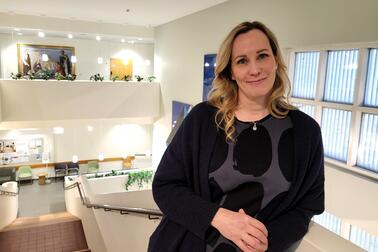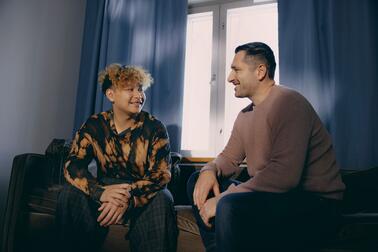
“At the latest, the pandemic period revealed the increased need for support of informal caregivers. We received a lot of feedback, phone calls and messages telling us that people were really struggling. We realised that informal caregivers need much more intensive and individualised support than we had offered before,” says Project Manager Mari Helin.
Cooperation with non-governmental organisations (NGOs) has also been clarified. In future, the city will focus more on providing personal support and coaching for informal caregivers.
“We have shaped the focus of services to avoid overlaps with the services offered by NGOs. NGOs do excellent work and offer opportunities to participate in various peer support groups, for example. We have limited our activities to more individual support,” Helin explains.
Adapting to informal care takes time and support – social instructors help
Informal care changes the dynamics between family members and spouses. The situation is new, and suddenly the informal caregiver has a lot of new responsibilities and things to sort out. Their need of support increases.
When the informal care begins, each new informal care family automatically receives a referral to a meeting with a social instructor.
“We contact the clients and arrange a meeting. This way, informal care families are contacted immediately and know who to contact if needed. During the meeting, we go over the family’s overall situation and inform them, for example, about the informal caregiver’s leave, free coaching and various paid services that can be provided at home,” says Social Instructor Ulla Säkkinen.
“We get to know each other, so to speak. We also ask families how they are doing on a regular basis,” Säkkinen continues.
In addition to the new situation, an informal care family’s daily life may also involve incipient crisis factors that should be addressed at an early stage, such as deteriorating functional capacity, mental health or substance abuse problems of the caregiver or the person being cared for. Caregivers must also remember to take care of themselves.
“To be able to take care of their loved one, informal caregivers must remember to also take care of themselves. Adequate support at the earliest possible stage makes it possible to organise everyday life that works and is as safe as possible and to improve quality of life. Sometimes the support can be short-term,” says Social Instructor Lahja Lahtinen.
Reform gets good results – joint development continues
“Informal caregivers have appreciated that we focus on their situation instead of handing them a stack of leaflets. More and more informal care families are now taking part in coaching, which is wonderful,” Lahtinen says.
“All in all, we have received excellent feedback on the reform,” the trio are happy to report.
The development work will also continue systematically this year. In addition, a thesis is being written on the reform.
How was the support for informal caregivers reformed?
- In future, all new informal care families will receive a referral to a social instructor. Each family’s situation is reviewed in person, and families have direct contact whom to ask for more information about services.
- The aim is to provide early support and specifically based on what clients need. Clients are asked regularly how they are doing.
- Cooperation with NGOs has been clarified. In future, the city will offer more personal support and coaching. NGOs offer opportunities to participate in various peer support activities, for example.
There are activity centres for informal care all over Helsinki. Their services are free of charge to the clients. For more information, please ask the social instructors of activity centres for informal care.
Text Hanna Hänninen


